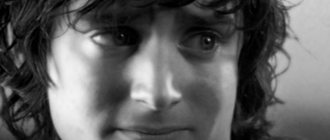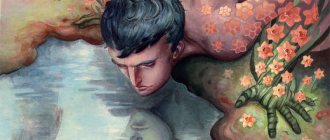According to the classification of character types, many behavioral aspects of a person can be predetermined. Scientists distinguish different types, however, the unstable character of a person is one of the most common among the teenage group.
In the future, the character, as a rule, changes. But there are many people whose unstable character type persists into adulthood.
Psychologically unstable character: should you be afraid?
Character is the greatest multiplier of human ability.
Fisher Kuno
- 1. Traits of an unstable character type
- 2. Formation of an unstable type of character
- 3.Lifestyle
- Only introverts can see these hidden images, thanks to their unique powers of observation.
- Introvert - who is it? The whole truth about introverts
- "Rorschach stains" or a test for psychopaths
- Who do you see first? Your answer will show your personality!
- Psychology of color: How each color characterizes personality
Character traits
Unstable individuals do not like to make choices and take responsibility for them. They say about such people that they go with the flow. Therefore, they usually “wash up” on shores that do not promise anything good. Finding yourself in bad company, where idleness and self-indulgence are only welcomed.
If you control their activities, they will do the work conscientiously, but as soon as they are distracted for a short time, they immediately sabotage the entire process and devote themselves to relaxation to the fullest, without regretting previously expended efforts.
It's all about weakness of will; this psychotype is not able to adhere to the regime and deny himself pleasures.
Emotionally also unstable, capable of committing rash acts, focusing only on impulses. A complete lack of rationality often leads to dire consequences.
Building a strong, healthy family or achieving career heights is not so easy if you constantly indulge your momentary desires and impulses.
They don’t like sports and anything that implies hard work, stability and resilience. Attention is attracted only by what promises to give a storm of emotions.
This is why people are mostly into racing. In order to get adrenaline, they can even risk their lives by performing some dangerous stunts without having worked out their riding technique in advance.
They strive for a free life, devoid of problems and various hassles.
Symptoms of epileptoid personality disorder
If we talk about the classification of emotionally unstable personality disorder, ICD-10 divides it into two subtypes:
- Impulsive.
- Borderline.
Emotionally unstable personality disorder of the impulsive type is characterized by severe emotional lability (frequent change of mood for no reason), a tendency to impulsive actions and aggressive outbursts with an inability to restrain itself. People with this disorder have a hard time withstanding criticism and reproach.
Epileptoids are characterized by jealousy, suspicion, a tendency to manipulate, irritability and outbursts of anger.
Emotionally unstable borderline personality disorder is less characterized by aggressive behavior towards others, but such people are prone to self-harm, even suicidal behavior. Read more about borderline disorder.
According to ICD-10, the disorder is characterized by general features of a personality disorder and specific features. The general criteria are as follows:
- begins to manifest itself in childhood and adolescence, persists into adulthood;
- it is difficult to identify clear phases of recovery/exacerbation;
- character traits prevent you from communicating with loved ones and strangers, and prevent you from developing professionally;
- a person is often self-centered, incapable of empathy (sympathy for other people), and constantly strives for pleasure.
Specific symptoms of the impulsive (explosive) type of emotionally unstable personality disorder:
- Impulsivity in thoughts and actions.
- Low ability to self-control.
- Outbursts of anger.
- Tendency to cruel and antisocial behavior.
- Intolerance of blame and criticism.
To diagnose the impulsive type of emotionally unstable personality disorder, the psychotherapist talks in detail with the client.
Differential diagnosis is carried out with other personality disorders (borderline, hysterical), as well as with epilepsy. For this purpose, a pathopsychological study is used (performed by a clinical psychologist), EEG, and Neurotest.
An integrated approach to diagnosis is necessary so that the doctor can prescribe the most effective treatment for a given person.
Resources and limitations
They do not appreciate the care and love of their loved ones. Parents, family partners, friends are perceived only as a means of obtaining something that they do not want to organize for themselves.
For example, the psychology of such men is such that they tend to mistake their wives for service personnel. That is, they demand to fulfill their duties without giving anything in return.
Why don’t they help with household chores at all, considering cooking and cleaning not a man’s job? Even if they are unemployed, while the spouse is also officially working somewhere.
Unstable people are not the best friends; they will exchange a loyal and close person for the company of those with whom they can have fun. This happens because they do not need relationships, but at the same time they categorically do not accept loneliness.
They do not know how to empathize and care about others. The reasons are simple - they simply do not experience feelings of pity, guilt, and try their best to avoid sadness and pain. That is why they live one day at a time, without thinking about the future.
For example, if they have a large sum of money in their hands, they will immediately spend it on entertainment. And you won’t even think about using it rationally or putting it aside for some extremely necessary needs.
Despite the fact that the main signs of an unstable type are rather negative, there are also positive aspects to their character.
They can be useful for people who do not know how to have fun and relax. That is, those who are overly responsible and serious. After all, sometimes you really need to rest, listen to your desires, realize them without feeling guilty for allowing yourself a little joy.
Completion
And that’s all for today, dear readers! We invite you to familiarize yourself with each existing type of character accentuation. To have complete information about what kind of people there are. Then it will become easier to build relationships with them and understand the motives of their actions. Accept them as they are, without demanding the impossible.
You can start, for example, with the cycloid psychotype.
Take care of yourself and be happy!
The material was prepared by psychologist, Gestalt therapist, Alina Zhuravina
Read further:
What is a sensitive character type and the main features of this accentuation?
Types of personality accentuation with a description of the nature of each
What is a pedantic type of personality accentuation and what are the main character traits?
6 recommendations for changing the anxious type of character accentuation
Astheno-neurotic type of personality accentuation: character traits
8
UNSTABLE PERSONALITY TYPE.
Unstable personality type (antisocial)
in general, it is characterized by a weakening of volitional functions directly related to the rejection of public moral and ethical standards. Typical defense mechanisms for this type are the mechanism of omnipotent control, regression, denial, conversion, fixation, splitting and dissociation. This is perhaps the most outwardly frightening personality type encountered in the world of psychiatry. The teenage period of unstable individuals is perhaps the most difficult in their lives. This period of time is characterized by a weakening sense of attachment to their parents. Reverence and love for parents even in childhood is only formal. Deceit and manipulative abilities allow them to escape from the care of their parents. From time to time you have to deal with suicide attempts of this type. But all of them are in the nature of blackmail behavior, a game through which they gain the freedom of action that they need. Sports sections and technical clubs most often make do with them. Although in a number of cases it was necessary to observe teenagers of this type attending martial arts and boxing sections. But the interest in such activities was always of applied interest and was quickly abandoned by them. This is easily explained, since attending such events is associated with certain rules and discipline, which is unusual for this type of personality. The tendency to group, experiments with alcohol and drugs, reactions of emancipation and opposition form the basis of the behavior of an unstable teenager. During this same period, their cruelty and aggressiveness towards the world around them is most noticeable. This type is very interesting in terms of choosing their profession. The fact is that they are relatively indifferent to their future in their youth. This is not to say that they are not at all interested in it. Many of them, describing their plans, point to the need for material well-being and freedom of action. At the same time, almost everyone pointed to such an obligatory point as the lack of effort to acquire these material values. Relative control of their future still remains with the parents. And this is provided that this control brings impressive dividends to this type. These people rarely tell the truth. They cannot be trusted in anything, since these individuals do not have firm principles, and the concept of morality and duty is alien and unacceptable to them. However, the art of manipulation, complete, but sometimes well-hidden unprincipledness and risk-taking often lead this type of personality to key positions in politics, economics, government and law enforcement agencies. From persons of this type revolutionaries are born in the literal and figurative sense of the word. And, of course, this type of personality is the fifth column of the criminal world. After re-reading the description of this person, a terrible picture of a potentially criminal element with loose manners, boorish habits and obscene turns of speech appeared before my eyes. But in fact, for the most part this is not the case. A similar picture can be observed in these individuals only during adolescence, and even then not in all cases. Moreover, the paradox of this type is that in some cases these types, as they grow older, sometimes become outwardly absolutely adaptive, which indicates a high degree of survival in extreme environmental conditions. If a given person, due to circumstances, avoids self-destruction and does not end up in places that are not so remote, then starting from adolescence, she begins to “burn out.” For example, I remember several personalities that I observed in the nineties. They did not imagine themselves outside the criminal circle, however, as the country emerged from the crisis, they exchanged their leather jackets for white shirts and successfully operate within the framework of legal business and entrepreneurship. I also observed representatives of this type of personality among representatives of government agencies and show business. Thus, this type of personality is not in all cases associated with the phenomena of the criminal world. Pointing to an unstable (antisocial) personality type, I am talking only about the patterns of development, characterological properties and internal motivation of a group of people. And with a favorable combination of circumstances, this person can achieve, thanks to his characterological properties (the ability to take risks, manipulative abilities), a high position in society and become an outwardly exemplary citizen of his fatherland. But, in fairness, it must be said that in the overwhelming majority of unstable personality types, absolute adaptation does not occur. And if a directed emotional blow throws an unstable person out of balance, then all the luster of a “gentleman from high society” is instantly lost before our eyes. Hence, it can be assumed that when experiencing a personally significant psychotrauma, the unstable type gives decompensation, indicating the “dormant” shadow side of this subject.
Every day we come across different types of people, with different characters and temperaments. You may have had to deal with people who are quite short-tempered. Intemperance is the main characteristic of such individuals. And there is no point in condemning them for this. One can only sympathize with such people. After all, their weak nervous system can provoke the development of asthma, cardiovascular diseases, etc.
Emotional instability
So, emotional incontinence is not a disease, but a personality disorder. It is characterized by impulsiveness in decision making, outbursts of negative emotions, problems controlling one’s own actions, and excessive irritability.
Looking from the outside at an emotionally unstable person, one gets the impression that she is unable to control herself. This is due to the fact that the above signs in such people appear constantly and do not depend on situations, stress factors, etc.
Individuals with emotional incontinence are unable to control their irritability regarding what is happening around them. They strive to find reasons to throw out their emotions. It is worth noting that such people are impatient with the opinions of others and do not tolerate criticism and objections.
Emotional incontinence is characterized by various causes of its occurrence. This can be either as a consequence of a head injury, various diseases (multiple sclerosis), or emotional stress, somatic disorders, etc.
Classification
Incontinence is divided into borderline and impulsive.
- Borderline emotional incontinence is characterized by increased impressionability and vivid imagination. People belonging to this type take personal failures or obstacles encountered in their lives too seriously. They often exaggerate any circumstances that have happened, and this often leads to stress. Such incontinence finds its manifestation already in adolescence. During this period, the teenager’s desires prevail over generally accepted prohibitions and rules. Such individuals are characterized by restlessness and frequent mood swings, which is the cause of inattention. People with borderline emotional incontinence suffer from a violation of self-identification, a manifestation of personal weakness in solving life problems. Sometimes this can be the cause of bad habits, crime, and depression. Intemperance and swagger in behavior are characteristic of some of this type of people. The main features of the manifestation of imbalance in the behavior of such people are: jealousy, which is not justified in any way, conflict, and suicidal blackmail is not excluded.
- Impulsive emotional incontinence is characterized by increased excitability of the nervous system. People of this type react to small irritating factors as if they were directed against them. Children with impulsive emotional incontinence exhibit resentment, aggression, capriciousness, and hysteria. If such a person has failed to become a leader, to take a leading position, he withdraws into himself, restraining his aggression against the world around him.
The main signs of this type are: playing with negative emotions “in public”, attacks of anger and rage.
The behavior of such people alienates those around them, and in this regard, in individuals with emotional incontinence, an even more cruel personality is formed, which is not able to build friendly relations with the world around it.
So, every person is sometimes unable to cope with the emotions that overwhelm him. But do not forget that you need to work on your emotions and nervous system so as not to be led by your emotional state.
Related articles:
| Bulimia - treatment If there was a universal pill for all diseases, then humanity would live almost forever. But unfortunately, it exists only in fairy tales, and in reality, most diseases are psychological in nature. Bulimia is no exception. If you want to start fighting this disease, then you need to start with the head. We will tell you further how to do this and what the treatment consists of. | Pornophilia Until recently, it was forbidden not only to talk about sex, but even to think about it. However, after the sexual revolution, not only services of all kinds began to appear, but also human vices. One of them is pornophilia. Why does a person become addicted to the next dose of erotica? We tried to find out. |
| Depression Surely everyone knows the state of mind in which a feeling of heaviness arises. Usually they say that there is a stone on the soul. Psychologists call this state depression. What are the reasons for its appearance and how to remove a heavy burden from the soul? We will talk about this in more detail. | Emotional stress It's no secret that a person's emotional state often becomes the cause of real physical ailments. For example, if you receive banal emotional stress, its consequences can be the most unpredictable. What is this disease and how to avoid it? We'll talk about this later. |
Announcements for neighbors: 25 photos that will make you cry with laughter Iron ladies: 7 shocking transformations of women after the “rocking chair” 5 things that are normal for Russian women, but wild for Eastern women 10 products that are very similar to human organs
| Our stars without makeup: 15 photos that will surprise and even shock | The wind against celebrities: 20+ photos that will definitely make you smile | |
| “Killer” advertisements from Russian streets and public places: 20+ photos | Meanwhile in Australia: 20 photos that will impress and even shock | 20 strange things that are difficult to explain and difficult to understand |
Sources used:
- https://cmzmedical.ru/zabolevaniya/emotsionalno-neustoychivoe-rasstroystvo-lichnosti/
- https://psy.wikireading.ru/68396
- https://qvilon.ru/psihologiya/neustojchivyj-tip-lichnosti.html
- https://avgur65.livejournal.com/4500.html
- https://womanadvice.ru/nesderzhannost
Childhood
Children with unstable character accentuation according to Lichko are distinguished from others by their restlessness. They are disobedient and at times uncontrollable.
They can be punished countless times. Explaining why it is forbidden to do something, even until you become hoarse, will still not take requests and decrees into account.
The will is poorly developed, and accordingly, they are unable to force themselves to study, work and help their parents with household chores.
They want to have fun all the time, have fun and just relax. They are easy to control because they are quite cowardly. Therefore, if you intimidate such a child at least a little, he will be ready to do anything just to avoid something terrible.
By the way, due to cowardice and anxiety, children with unstable character types are predisposed to phobic disorders and panic attacks. They often have stuttering, enuresis, neuroses, and so on.
They look for every opportunity to avoid studying. At older ages they skip school. And in the first grades they can pretend that they are not feeling well, lying that they have already completed all the assignments.
They are usually characterized as children with deviant or even delinquent behavior.
That is, inclined to commit acts that are hooligan, or even illegal.
They try cigarettes, alcohol, and drugs early. And not because they like the taste, the state of intoxication. They just want new sensations and impressions. Otherwise, life seems gray and dull, and this is what they fear most.
They run away from classes and walk around the city, looking for people like them to have a lot of fun. They also gain sexual experience early, among the first among their peers. They are often familiar with various perversions.
There can be no talk of fidelity in later life. They don’t see anything reprehensible in cheating, because they are completely unable to resist temptations.
By the way, the desire of parents to control their every step only provokes them to run away from home. So, in raising children with an unstable type of character accentuation, one should learn to maintain a balance between overprotection and complete permissiveness.
Although, if a person is already mature, excessive control, on the contrary, helps him lead a normal social life without addictions and other manifestations of deviance. Provided that he will be under care literally every second.
Emotionally unstable personality disorder - treatment
People with emotionally unstable personality disorder especially urgently need the help of a psychotherapist. A specialist can teach them to control their emotions and prevent the negative impact of emotional outbursts on others (with impulsive disorder) and on the person himself (with borderline personality disorder).
Labile personality disorder has been described as one of the most difficult diagnoses to treat. Establishing contact with a person who suffers from an emotionally unstable personality disorder is not an easy task for a psychotherapist. Inexperienced specialists avoid a strong alliance with such patients so as not to lose their own peace of mind.
But it is important to remember that a personality disorder is not a disease; the patient does not have damage to the nervous system. Consequently, with proper treatment, it achieves serious positive results. People with borderline and aggressive personality disorders should be treated by an experienced psychotherapist.
Important
Psychotherapy is the main non-drug treatment method for mental disorders. Unlike medications that eliminate symptoms, it works with the cause - allowing you to achieve long-term, lasting results.
The main treatment method for emotional personality disorder is psychotherapy. Drug treatment is not used in all cases. Medication support is sometimes necessary if the personality disorder is combined with other illnesses, such as depression.
The most effective techniques for working with people who suffer from emotionally labile personality disorder are cognitive behavioral therapy and dialectical behavior therapy. They help patients become aware of the thoughts and feelings that influence their actions and teach them how to control themselves.
If all the doctor’s recommendations are followed and, most importantly, the patient’s desire to interact with the psychotherapist, therapy has a lasting positive effect. At the same time, the specialist does not seek to change the patient’s personality, but helps to accept himself and learn to live in harmony with himself and others.
Author: Specialist of the Alliance Mental Health Center
Prices for services
| 6,000 rub. | |
| Individual psychotherapy session with a subscription for 10 sessions | 6,000 rub. 5,400 rub. |
| 8,000 rub. | |
| Biofeedback therapy session (I-st) with a subscription for 10 sessions | 4,000 rub. 3,600 rub. |
SpecialistsDeputy Head of the Center, psychotherapist, psychiatrist
- Individual psychotherapy
- Family psychotherapy
- Psychopharmacotherapy
- Rational psychotherapy
Psychotherapist, psychiatrist
- Suggestive therapy
- Reconstructive-personal psychotherapy
- Rational psychotherapy
- Individual psychotherapy
Psychotherapist, psychiatrist
- Individual psychotherapy
- Family psychotherapy
- Cognitive behavioral psychotherapy
- Reconstructive-personal psychotherapy
Psychiatrist, psychotherapist
- Ericksonian hypnosis
- Neurolinguistic programming
- Cognitive behavioral psychotherapy
- Holotropic Breathwork
Psychotherapist, psychiatrist
- Body psychotherapy
- Cognitive behavioral psychotherapy
- Child-parent relationships
- Art therapy
Unstable type
Krap is the only one who named representatives of this type - unrestrained, unstable.[70] Schneider emphasized in his titles the lack of will (“weak-willed”, “weak-willed”). Their lack of will clearly appears when it comes to study, work, fulfilling duties and obligations, achieving goals that are set for them by relatives, elders, and society. However, in the search for entertainment, representatives of this type also do not show assertiveness, but rather go with the flow.
As children, they are distinguished by disobedience, restlessness, getting into everything and everywhere, but at the same time they are cowardly, afraid of punishment, and easily obey other children. Basic rules of behavior are difficult to learn. You have to watch them all the time. Some of them have symptoms of neuropathy (stuttering, nocturnal enuresis, etc.).
From the first grades of school there is no desire to study. Only under constant and strict control, reluctantly obeying, do they carry out tasks, always looking for opportunities to shirk classes. At the same time, an increased craving for entertainment, pleasure, idleness, and idleness is detected early. They run away from classes to the cinema or just walk down the street. Incited by more shy peers, they can run away from home for the sake of company. Everything bad seems to stick to them. The tendency to imitate in unstable adolescents is selective: only those models of behavior that promise immediate pleasure, a change of easy impressions, and entertainment serve as role models. They start smoking as children. They easily commit petty thefts and are ready to spend all their days in street groups. When they become teenagers, the previous entertainments, like cinema, no longer satisfy them, and they supplement them with stronger and more intense sensations - hooliganism, alcoholism, and drugs are used.
Krapelin also wrote about the purposeless criminality of the unstable. The delinquency of these teenagers is primarily a desire to have fun. Drinking starts early - sometimes from 12-14 years old and always in the company of antisocial teenagers. The search for unusual experiences easily leads to acquaintance with drugs and various kinds of their surrogates. The unusual sensations and illusory experiences that arise during their action are shared with friends with the same rapture as they talked about detective films in childhood.
With the onset of puberty, such adolescents strive to free themselves from parental care. The reaction of emancipation in unstable adolescents is closely associated with the same desires for pleasure and entertainment. They never have true love for their parents. The troubles and concerns of the family are treated with indifference and indifference. For them, relatives are only a source of means for pleasure.
Unable to occupy themselves, they tolerate loneliness very poorly and are early drawn to street teenage groups. Cowardice and lack of initiative do not allow them to take the place of leader. They usually become tools of such groups. In group offenses, they have to pull the chestnuts out of the fire, while the leader and the more stenish members of the group reap the benefits.
Their hobbies are entirely limited to informational and communicative hobbies and gambling. They have an aversion to sports. Only the car and motorcycle remain tempting as a source of almost hedonic pleasure at breakneck speed with the steering wheel in your hands. But persistent studies push them away here too. But the theft of cars and motorcycles for the purpose of riding is a significant part of their delinquency. Amateur artistic performances do not attract them; even fashionable pop ensembles soon become boring to them. All types of hobbies that require some kind of labor are incomprehensible to them.
Sexual attraction is not strong, but being in antisocial groups leads to early sexual experience, including exposure to debauchery and perversion. Sexual life becomes the same source of entertainment for unstable teenagers as constant drinking and adventures. Romantic love passes them by; they are incapable of sincere love, as well as true friendship. Company for entertainment is always preferable to a devoted friend.
Studying is easy to neglect. No work becomes attractive. They only work when absolutely necessary. Their indifference to their future is striking; they do not make plans, do not dream of any profession or any position for themselves. They live entirely in the present, wanting to extract maximum entertainment and pleasure from it. Difficulties, trials, troubles, the threat of punishment - all this causes the same reaction - to run away.
Running away from home and boarding schools is a common act of unstable teenagers. When escaping, they look for asocial company, a suitable travel companion, under whose influence they easily fall. The first escapes serve as a primitive way to avoid trouble or, at least, delay punishment. Repeated escapes are often caused by a search for entertainment, a craving for a “free life.”
Suicidal activity, according to our observations, is not typical of unstable adolescents. Only among those who are conformally unstable do affective suicide attempts occur.
There are a number of points of view about the urgency of the unstable type - instability of emotions, weakness of will, disturbance of drives, pathological mobility of nervous processes, inability to develop a stable life stereotype, etc.
Weakness is, apparently, one of the main traits of the unstable. It is weakness of will that allows them to be kept in a harsh and strictly regulated regime. When they are constantly being watched, they are not allowed to shirk from work, when idleness threatens with severe punishment, and there is nowhere to escape, and everyone is working around them - they resign themselves for a while. But as soon as guardianship begins to weaken, they immediately rush to the nearest “suitable company.” The weak point of the unstable is neglect, an atmosphere of connivance, which opens up space for idleness and idleness.
The self-esteem of unstable adolescents is often distinguished by the fact that they attribute to themselves either hyperthymic or conformist traits.
Among male adolescents hospitalized in a psychiatric clinic, the unstable type was equally represented by both psychopathy and accentuation. As a rule, in cases of psychopathy, behavioral disorders begin in childhood.
In addition to obvious accentuation of an unstable type, when all the characteristics of behavior and character are obvious, one has to deal with hidden accentuation. In these cases, behavioral disorders characteristic of the unstable type are revealed suddenly, against the background of previous well-being. They are discovered when a situation of relative lack of control on the part of elders, unexpected for a teenager, is combined with the harmful influence of one of his friends.
A behavior pattern similar to that observed in representatives of the unstable type can occur in the process of psychopathization in other types - hyperthymic, hysterical, conformal. In these cases, the behavior of the unstable type is a layering on the endogenous characterological basis of a different type. Hyperthymic-unstable teenagers always show great activity, a desire for leadership in teenage groups, they are bold to the point of despair, and are not inclined to submit to a strict disciplinary regime, reacting to restrictions with violent protest. Hysterical-unstable people with the described intrinsically unstable type, in addition to external manifestations of behavioral disorders, are primarily united by deceit. However, the lies of the hysteroid-unstable are “cosmetic”, intended primarily to decorate their personality, self-aggrandizement, and are fueled by the desire to impress. They lie on their own initiative when circumstances do not force them to do so. The deceit of the self-unstable is always determined by the situation. It most of all serves the purpose of avoiding punishment, getting out of difficulties, and getting some benefits.
A special conformally unstable variant was encountered as a consequence of the psychopathic development of the conformal type in the premorbid. The reason was neglect, hypoprotection and accidental exposure to the company of antisocial teenagers. What followed was a gradual “getting used to” this environment, assimilating its behavior patterns, becoming familiar with its interests and values. As development progresses, the behavior becomes indistinguishable from the behavior of those who are actually unstable, and only a thorough anamnesis makes it possible to identify a conformal premorbid. Such teenagers retain conformity as the main feature of their character, but they become conformist in relation to antisocial teenage groups. Of the previous traits of the conformist type, the most firmly held is hostility towards strangers and suspicion of everything unfamiliar. For the truly unstable, strangers are more likely to serve as an object of fleeting curiosity or evil entertainment.
Finally, it is also necessary to mention the unstable-like variant of organic psychopathy.
An unstable type of psychopathy and accentuation is one of the most common among male adolescents under the supervision of a psychiatrist (11% among hospitalized adolescents without psychosis). In adults, this type of psychopathy is diagnosed much less frequently. Only less than 1% of several hundred psychopaths who underwent forensic psychiatric examination, i.e. in a population where representatives of this type could be expected relatively often, it was assessed as unstable. It can be assumed that a significant part of unstable adolescents, upon becoming adults, join the ranks of alcoholics and drug addicts. The diagnosis of “chronic alcoholism” or “drug addiction” obscures their past - psychopathy or accentuation of an unstable type. According to B.V. Marchenko, up to 30% of those suffering from chronic alcoholism can be classified as unstable type. 74% of adult psychopaths of the unstable type are diagnosed with substance abuse.
This text is an introductory fragment.
Hello, dear readers of the site! Today we will talk about what constitutes an unstable personality type. Let's find out its strengths and weaknesses, as well as how it can be identified.
Content:
Etymology
The word "paranoid" can be translated as "crazy." "Para-" - about. “Noo-” - mind, spiritual sphere. At the suggestion of Academician Vernadsky, the word “noosphere” entered the lexicon of humanity, by analogy with the stratosphere and biosphere... The noosphere, according to Vernadsky, is the mind of the Earth.
So “noo” is the root of the word “paranoid.” But “the tail is far from the nose,” and, as often happens in children’s drawings, the nose is an elephant, and the tail is a crocodile... The original meaning of the word “paranoid” (“insane”) was more in line with the essence, when it referred to patients with pure, that is, without hallucinations , delusions of persecution. But now it is applied to people with a paranoid psychotype. And for them the direct translation of this word does not fit the meaning.
The paranoid psychotype does not have such a deviation from the norm that borders on madness, but there is a main personality trait that determines many other things - an unusually pronounced sense of purpose.
So let’s not confuse a paranoid person with a patient with schizophrenia, in whom paranoid syndrome is the leading one.










